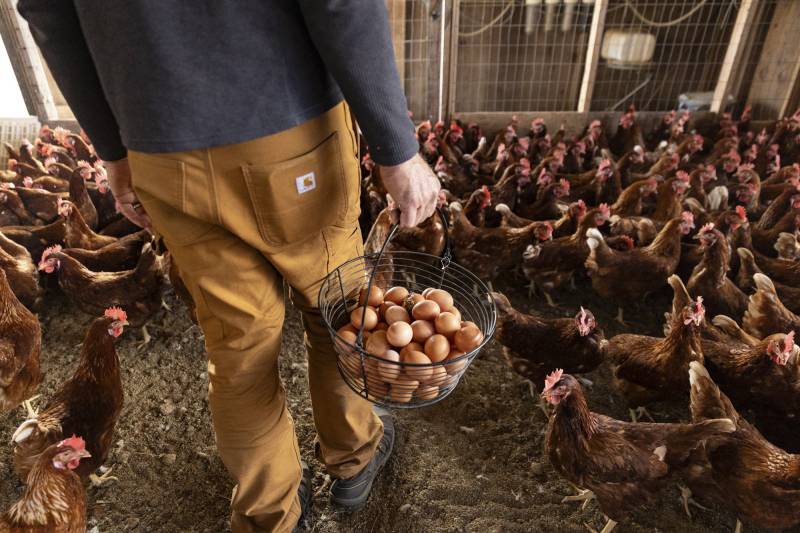Here are the morning’s top stories on Thursday, March 20, 2025…
- If you’ve been in your local market recently, you may have noticed empty shelves in the aisle where you normally find eggs. With the spread of bird flu, which is infecting chickens throughout the country, eggs have gotten expensive. Really expensive. The average price of a dozen eggs in California is now around $9.
- The University of California has announced it’s putting a pause on all new hires, in the face of uncertainty over its budget.
Bird Flu Still Has Widespread Impact On California Chickens
Alex Hoang is a Sacramento resident known for his chickens. He’s owned a small flock for years, often giving eggs out for free to his neighbors in Oak Park. His chickens are kept in a coop he’s constructed from repurposed dog fences in his backyard. Right now, he says he feels pretty fortunate to have access to free eggs. “The biggest benefit for me is if there is a massive culling, there’s a bird flu, there’s shortages, egg prices, doesn’t matter to me because I’m already producing my own food and I was producing it before there was a shortage,” Hoang said.
The current bird flu outbreak is not out of the ordinary. And it’s not the first time bird flu has caused a spike in egg prices. In the past, outbreaks were kept under control through depopulation measures. “That means if a farmer suspects they have avian influenza or for that matter backyard chicken person thinks they might have avian influenza, they tell the government, the government comes in and kills all their chickens and compensates them for all the chickens killed,” said UC Davis Agricultural Economics Professor Dan Sumner.
In a Washington Post op-ed last month, Agriculture Secretary Brooke Rollins said the Trump administration would examine “overly prescriptive laws” like California’s Proposition 12. She blamed the law, which was passed in 2018 and created minimum space requirements for egg-laying hens, for higher recent egg prices. Sumner said this law has made the average price of a dozen eggs about a dollar more in California than it is in other states. That’s partially because many farmers had to pay to make their facilities cage-free when the law was passed. But it’s not the reason why prices have jumped up now, as millions of chickens have been euthanized during this latest outbreak.
Experts said California poultry farmers are looking to repopulate their flock, replacing infected birds with healthy ones. But it’s unclear when the new birds might be able to improve the state’s supply of eggs for consumers.
UC President Announces Hiring Freeze And Other Cuts
University of California President Michael Drake announced a hiring freeze across the university system and directed campuses to cut travel, maintenance and other costs Wednesday during a meeting of the UC Board of Regents at UCLA.

